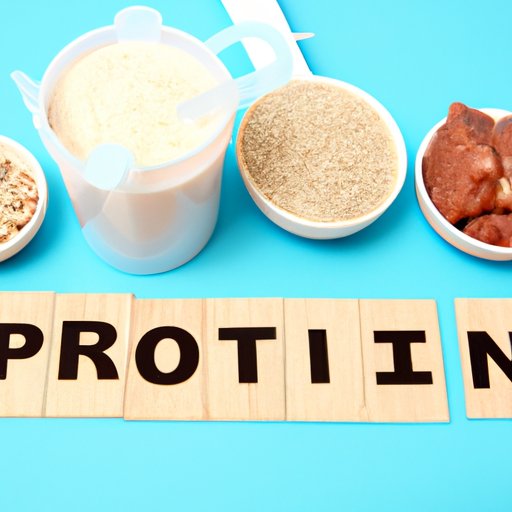
Introduction
Losing weight can be a challenging journey, but with the right tools and knowledge, it can become easier. One of the main questions individuals face when trying to lose weight is how much protein they need to consume in their diet. Protein is a cornerstone nutrient for weight loss, and in this article, we’ll explore the importance of protein, the recommended daily intake, and how to incorporate more protein into your diet.
The Science Behind Protein: How Much Do You Need to Lose Weight?
Recent research suggests that increasing protein intake can aid in weight loss. Protein has a thermogenic effect, and when consumed, it can increase the amount of energy your body burns, which can promote weight loss. Additionally, it helps to preserve muscle mass, which is crucial for maintaining a healthy metabolism.
The recommended daily protein intake varies based on age, sex, weight, and activity level. For adults, the daily recommended intake is around 0.8 grams per kilogram of body weight, but this can increase for those who are physically active or looking to build muscle.
Protein for Weight Loss: A Comprehensive Guide
Protein is essential for weight loss because it helps you feel fuller for longer and reduces the temptation to snack on high-calorie options. The optimal amount of protein needed for weight loss depends on the individual’s goals. For those looking to lose weight and maintain muscle mass, it’s recommended to consume around 1.2 -1.6 grams of protein per kilogram of body weight. Individuals looking to lose weight and gain muscle mass may benefit from a higher protein intake, which can range from 1.6-2.2 grams per kilogram of body weight.
Men typically require more protein than women because they have higher muscle mass and testosterone levels. However, women still need enough protein to support lean muscle mass and promote weight loss.
How to Incorporate More Protein into Your Diet for Weight Loss
Increasing protein in your diet doesn’t have to be complicated or expensive. Simple changes such as adding protein-rich foods to your meals and snacks, such as eggs, almonds, or plain Greek yogurt, can help increase your intake. Additionally, incorporating a protein shake or protein bar can be an easy way to consume protein on the go.
Here’s an example of a meal plan with high protein options:
- Breakfast: scrambled eggs with spinach and feta cheese
- Snack: apple slices with almond butter
- Lunch: grilled chicken with roasted vegetables
- Snack: Greek yogurt with sliced strawberries and granola
- Dinner: baked salmon with sweet potato and asparagus
The Benefits of a High Protein Diet for Weight Loss
A high protein diet offers several benefits for weight loss. Protein is an essential nutrient for your body, and when consumed, it can help maintain and repair muscle tissue, which is crucial for a healthy metabolism. Additionally, consuming protein is linked to a higher feeling of fullness, which can make it easier to stick to a calorie-restricted diet.
Studies have also shown that a high-protein diet can increase the thermogenic effect, which can boost your metabolism and promote weight loss. However, it’s essential to consume protein in moderation, as consuming too much can put excess strain on the kidneys and liver.
Vegan or Vegetarian? Here’s How to Get Enough Protein for Weight Loss
Individuals who follow a vegan or vegetarian diet may find it tricky to consume enough protein, but it is still possible. Plant-based protein sources, such as beans, lentils, tofu, and tempeh, are excellent options for those following a meat-free diet. Additionally, quinoa, nuts, and seeds are rich sources of protein and healthy fats.
Here’s an example of a meal plan for someone following a vegetarian diet:
- Breakfast: oatmeal with almond milk, walnuts, and berries
- Snack: edamame
- Lunch: roasted vegetable and chickpea salad
- Snack: hummus with sliced carrots and cucumbers
- Dinner: lentil soup with a side of roasted sweet potato
Calculating Your Macros: A Step-by-Step Guide to Protein Intake for Weight Loss
Calculating your macros can help you determine the optimal amount of protein you need to consume for weight loss. Macros, short for macronutrients, are the three nutrients your body needs in large amounts: protein, carbs, and fats.
To calculate your protein intake, you’ll need to determine your daily calorie needs, then determine how many calories should come from protein. As mentioned previously, the recommended amount of protein is around 1.2-2.2 grams per kilogram of body weight.
My Protein Journey: How I Lost Weight by Incorporating More Protein into My Diet
It’s one thing to read about the benefits of a high-protein diet for weight loss, but it’s another to hear about someone’s success story. One individual reported successfully losing weight by incorporating more protein into their diet. They found that drinking a protein shake after their workouts and adding nuts and seeds to their meals helped them feel fuller for longer and curb cravings.
Conclusion
Increasing protein in your diet is an effective way to aid in weight loss and promote muscle growth. The optimal amount of protein for weight loss varies based on individual goals, but consuming around 1.2 -1.6 grams of protein per kilogram of body weight is generally recommended. By making simple changes to your diet and incorporating more protein-rich options, you can achieve sustainable weight loss.




